Don't wanna be here? Send us removal request.
Text
I agree that the discrimination in academia is very prevalent here. Class E is full of students that are behind academics. The rest of the school criticizes Class E for being lazy and dumb. However, koro sensei had actually personalized study materials for each student because every school learns differently. If students how the right guidance from their teacher then it possible for them to raise above.
Assassination Classroom
Assassination classroom is one of my favorite anime series of all time. I think it is an incredibly entertaining piece, with a lot of powerful themes and messages. It follows the story of an alien teacher, Koro-sensei, plans on eventually destroying the world, but spends his time teaching a class of misfits at Kunugigaoka Junior High School. The series follows the students as they learn how to grow and mature, all while trying to find a way to assassinate Koro-sensei. The series is definitely a must watch for any of you that maybe have not seen the entire thing, it is honestly very good.
It was a little bit weird that we only watched the first two episodes and then two near the end, so I will only be discussing the themes displayed in those few episodes, not any other ones that occur throughout the piece (since I would feel bad spoiling such a fun show). But the main theme in this anime is that of discrimination and educational inequity. Class E is looked down upon and are viewed as misfits that are not smart enough to do well in school and don't care enough to get there. They are consistently the lowest in scores, have teachers that don't care about their education, and transferring to their class is used as a "punishment" for other students that get below average test scores. However, because they aren't given any opportunities to actually learn and grow, those who end up in Class E are often stuck there.

I thought this reminded me a lot of what we often see in current school systems. I know that when I was in elementary and middle school, our classes were split up by test scores as well (I know public schools had a similar system of gifted vs not). But my school, specifically 8th grade, was split up into 8-1, 8-2, and 8-3, with 8-1 being the kids with the lowest scores who were deemed not academically gifted, and 8-3 being the students doing high school level coursework. And the difference in the treatment of the children in the classes was drastic. I remember, whenever people got into trouble with the administration of the school, 8-3's opinion and what the students in that class said actually happened was what the teachers believed. Even if what they were saying was completely untrue, 8-1 was deemed untrustworthy because they often did not pay attention in class and fooled around a lot. And I know that idea of teachers and staff preferencing the "smarter" students that sit there and studiously do all of their work is still a very common issue. As someone who also has experience with education, I have seen that before as well. Although I worked in a preschool, not a high school, the students that typically acted out or seemed to struggle a bit more with concepts often frustrated the teachers, and I know in some education systems, those students get overlooked and end up falling behind. But dispersing students into classes based on "ability" ends up lumping them into a box that they will be stuck in for (very likely) their entire schooling career. I know there have been multiple studies proving that, and the fact that the way your teachers or administrator at your school view you and what group they lump you in, often defines how you see yourself and affects your later academic achievement. And this is something that is perfectly demonstrated in this piece.
However, this piece also serves as a critique to that idea of people being worthless or born with a set ability. We see that by the end of the series, Korosnsei has given them time, meaningful lessons, and showed them that he truly cared about them. He was very likely the first teacher to do that. But by doing that, Class E was not only able to catch up to the other students, but their test scores actually exceeded that of the students in the top class, proving that with the right guidance and a good teacher, you can do anything, no matter where you come from. I thought this was a very beautiful theme, and a very unique one that I don't see portrayed in a lot of anime specifically, so it was very interesting to see it in Assassination Classroom.
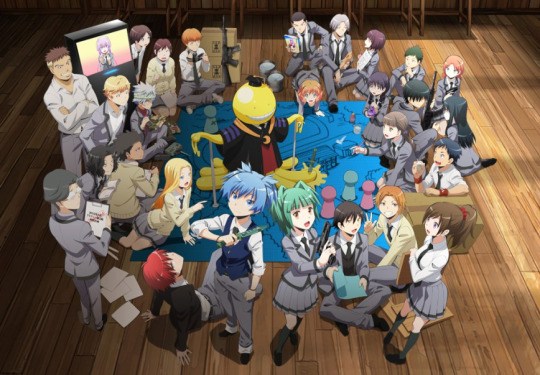
Overall, I love this show and I think it is a great example of how discrimination in the academic world affects people and how it can be overcome. I am glad that we got to watch this as our final anime of the semester and I definitely plan on rewatching the entire thing once I am doing my summer internship. It was nice meeting all of you and seeing your thoughts on different pieces. Goodbye <3
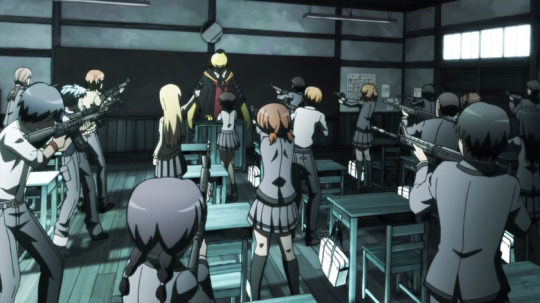
8 notes
·
View notes
Text
Assassination Classroom (s1 ep 1,5,16 and s2 ep 11)
I had to rewatch Assassination Classroom because it has been a while. However, this time I actually paid attention to the social issue in this anime. Before, I start ranting on about this anime. Can we agree that most of us voted on Assassination Classroom because we figure out it was banned in Florida schools?
This anime shows the separation of the “lost cause community”, aka class E. The school moved Class E into an off-site campus building in the mountains because to them Class E is a lost cause and not worth the resources. Even Karasuma-sensei and bitch-sensei realize how can Class- E is able to work in a classroom without proper air-conditioning and when Karasuma tried to request air-conditioning it was denied to “lack of funds”. The principal and teachers on the main campus use and encourages the degrading of Class E to influence the students to work hard to prevent going to Class E. They typically use the school assembly to make this point. Even the government had similar attitudes towards Class E, they choose Class E to learn assassination techniques and pressure to kill Koro-sensei. I think Ryoma had told Nagisa that both the school and government had labeled them a lost cause with the potential to commit murder. Hence, why they were chosen to kill Koro-sensei.
It was kinda nice that Koro-sensei, Karasuma-sensei, and bitch-sensei were the only ones to see the potential of Class E. They put all of their efforts to get Class- E to beat the top students in the main class. It was sad that they had to kill Koro-sensei, the main person that help them realize their true potential, for the greater good.
The last episode had show Class- E as Adults was a nice message that a lost cause will always have the potential to grow. Most of Class E has grown to have a successful life. Nagisa had chosen to become a teacher to a class of misfits, taking a page from Koro-sensei’s book. He wants to be that person that shows the “lost cause” students that they have the potential and do not let others put a label on them.

10 notes
·
View notes
Text
I like how you connected the overuse of capitalism and the advancement in technology. Connecting the rise of price in healthcare that is shown in this was pretty daunting because we can see this the US. The pharmaceutical companies are constantly rise prices on medications because they know that people are willing to pay for medications to live. I like how you stated that as advancements in technology develops greed will eventually follows.
Cyberpunk Edgerunners( Eps. 1,2,6,10)

Cyberpunk Edgerunners did not live up to the high praises for me, even though it was still a good show. The story felt rushed and did not convince one bit of me to play the video game as it was meant to do.
This show was meant to be an appetizer for Cyberpunk 2077, but it ended up providing some good insight into how capitalism is slowly but surely destroying the planet. David is somewhat of a problem child who causes a lot of problems for his single mother, who was barely making enough so that he could afford to go to school. After causing trouble at school, his mother had to go to his school to pay reparation money for what he did. On their way from there, they got into an accident that caused his mother's death. I believe that he's partly to blame for that, but the insurance company that came after the accident didn't help either. Since David and his mother weren't covered under insurance, the insurance workers didn't bother to help and left them to die. I think this serves as a warning about how the continuing increase in the price of healthcare and other things can be detrimental to the less fortunate.
This series also explores the effects of artificial intelligence and corporate greed. The artificial intelligence in this world is super advanced in that people don't even use phones anymore and talk with something in their eyes (I don't think it was ever explained what it was), and people can implement superpowers in their bodies, which I thought was cool. However, great power is always followed by greed. We saw how the higher class in that society wanted to control everything and even use humans as test subjects.
Overall, Cyberpunk Edgerunners was a good watch, and the animation was great. I would rate it at 7/10.
2 notes
·
View notes
Text
Cyberpunk Edgerunners (ep 1,2,6,10)
This show highlights the social problem of division of the social classes. The first episode shows the treatment of the lower class in a night city. The show opens up with David trying to wash his academy uniform, but the washer was not able to continue washing his clothes due to insufficient funds. He tried to use a bootleg version of the software that was needed for his class. His mother is seen as tired from working hard to get David a good future in the academy. However, most children of the wealthy are able to afford to go to the academy so David was sticking out like a sore thumb. When David and his mother were in a car crash, the ambulance came they had to scan both David and his mom to see if they were important customers. Once they pronounce them as not important customers, they left them injured at the scene. Everything in this show is ruled by money. Even the doctor's decision was dependent on how much money David paid to save his mother's life. It is sad to see everything in the night city is dependent on money, even medicine. It shows that the poor are not able to climb their financial status as they are consistently challenged by society. Hence, the appeal of committing crimes for easy money is appealing. David becoming a cyberpunk was a bit sad. His mother, a former cyberpunk, had tried her best to give David a better life than hers. But, in the end, he became a cyberpunk. He had learned to steal, fight, and even kill from Maine and the crew. From Maine's words, he was becoming a man, especially after sleeping with Lucy. When Maine turned into a cyber psycho, he told David that this was his end and he should leave the scene. David had tried to become the new Maine with his new body and tech ware. In saving Lucy, he risks his psychosis and died saving Lucy. Well, at least Lucy got a chance to go to the moon.
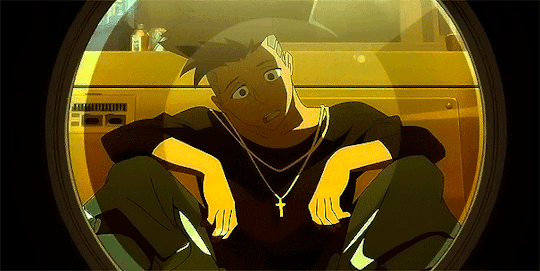
4 notes
·
View notes
Text
I definitely agree that it was confusing to tell if Mima was hallucinating or in reality. I agree that this anime does a nice good highlighting the dark side of fame. I think that in terms of mental health, this anime tried to show the dissociative identity disorder of Rime and how she had made Mima question herself.
Perfect Blue

Perfect Blue was an interesting watch as it touched on some complex themes like the concept of identity and the effects of fame on a person's mental health.
Mima left the pop idol life and embarked on a new journey to pursue a career in acting. However, things did not go as she expected as she had some lunging deep within her that didn't want to be an actress. Her inner self hindered her progress toward self-discovery as she was overconcern about her public image. Mima struggles to shake off that feeling, and she starts hallucinating her dark side. As she continues to struggle with this new part of her life, she starts losing touch with reality and is haunted by her pop idol past and the scene she had to force herself to act out even though she didn't like it.
The film's use of imagery and nonlinear storytelling showcase the psychological turmoil that Mima was experiencing. The nonlinear storytelling that the film exhibits mixes up reality and fantasy, creating a dreamlike atmosphere that emphasizes Mima's turmoil. It was confusing for me as I couldn't tell if she was hallucinating during the last thirty minutes of the film or whether that was happening in real-time and that her past self had taken over. The film uses mirrors and reflections to showcase Mima's struggle with her identity as an actress or a pop idol and the different personas she is forced to adopt while acting.
Overall, Perfect Blue is an excellent example of how fame can be too much for a person and drag them to their mental health limits and break them. It was a good watch, but too much thriller for me, 6/10.
8 notes
·
View notes
Text
Perfect Blue
This anime portrays the dark side of fame. The overwhelming anxiety the celebrities feel to maintain their fame and please their fans. Mime had to choose from being a singer or actress. Even though she loved singing as a pop star, her manager convinced her that she will become more famous as an actress. You can see that is struggling with her decision to expand her fame as an actress. For example, she didn’t want to do the rape scene but she did it anyways because she couldn’t say no to the screenwriters. Even her former team members stated that Mime would pose nude to get more attention and that photographers will easily convince her to take off her clothes. However, she was surprised and distraught that the photographer had released her nudes. She constantly has illusions of her chasing her old self and questioning who is her true self, the singer or actress.
I think it is crazy that an obsessed fan that follows mime everywhere. He crosses the boundaries of a fan and he thinks that he knows her better than herself. He literally kills anyone that “wrong” Mime. This reminds me of sasaeng fans, a term given to an obsessive fan who stalks or engages in other behavior constituting an invasion of the privacy of the artist. The obsessive fan is seen protecting Mime's image and is responsible for the deaths.
I think the confusing part of this anime is trying to figure out what is real or acting. I think this is the same difficulty for Mime, she cannot tell what is acting or not. Honestly, for a second, I thought that she was actually the “obsessive fan” and she was the one killing the screenwriter and photographer. I feel that stress on Mime made her develop dissociative identity disorder. She frequently questions who she is and her actions. She questions if she Mime the actress, Mime the singer, or Mime the killer. She has a hardcore identity crisis. I think that she tried so hard to become the perfect actress that she lost sight of reality.
Wait, did Mime or Rumi have an identity crisis? Was this crazy past Mime and Killer actually Rumi? Was Rumi driving the real Mime crazy? I mean in the end, the real Mime visited Rumi at the psych ward when Rumi was still in a dissociated state.

0 notes
Text
Kobayashi-sensoron Manga
This manga was a very conservative and nationalistic view of Japan. The first conservative message was how the Japanese people had adopted individuality instead of the collective good of the nation. This manga harshly criticizes the Tokyo War Crimes Trial that was to “program” in still guilt upon Japan from the Americans and brainwash Japan to consume an anti-war perspective. I could understand that America is not free of horrific war actions. I agree that the two atomic bombings killed nearly 300,000 people and the U.S. also had concentration camps holding the Japanese descendants. However, I was disgusted by how this manga tried to minimize Japan’s war crimes against Chinese and Korean people. The manga had a panel that stated that China and Korea were satisfied with Japan’s attitude in punishing the war criminals since their nationalism had focused on “anti-Japanese”. I am not gonna lie, I agree that some of these War crimes actually still cause some resentment toward Japan. I know that my roommate, Korean born, has extremely negative feelings towards Japan because of the conflicting history.
Can we talk about these “fake war pictures”? I have personally seen the pictures of the Nanking Massacre and know some details about these actions seen the picture. The manga tries hard to prove the Nanking Massacre photos as non-credible and false photos to brainwash the “youth” about Japan’s actions in war. The second photo that the manga had tried to falsifiable that this wasn’t the part of Nanking massacre but was a result of an air raid gone wrong that people were tramped in panic. First of all, I call bullshit on this! If you search the real picture you can see that most of the corpses were women and children. The women in the picture were pantless while they were “trampled”. The massacre of Nanking is also known as the rape of Nanking because of the rape and murder of women and the killing of children. The agenda of the Manga is to twist the narrative of these brainwashing photos to minimize the actions of Japan in the war.
Another selection of this manga was to state that the testimonial of these war victims should not always be believed only because they cry and point fingering. The manga tries to undermine the testimonial of these battlefields' comfort women (mainly Chinese and Korean women) that they captured by Japanese solider and were forced to pleasure the soldiers. However, the manga tries to say how can we believe these testimonials without true physical evidence. The manga stated why these comfort women waited so long to come forward to tell their “story” and not immediately after the war. However, I am pretty sure many of the women had tried to overcome the trauma and were scared to disclose their stories for fear of being criticized or shamed.

1 note
·
View note
Text
I agree that this shows focus on traditional vs modernity. Mitsuha who lives a traditional, religious life in a rural area compare to Taki lives in the big modern city. I wanna point out that Mitsuha thinks that a boy living the Tokyo must be living a carefree life style. However, that is not the case, Taki is consistently working to afford the lifestyle in the big city, so not as carefree.
Your Name Reflection

I'm going to redacted redacted redacted redacted redacted myself i tried to copy + paste my writing so that i could check the word count and then deleted it all. L moment. this is me trying to write everything again and trying to not lose my mind
ANYWAYS. This is not the first time I've watched Your Name, but it's nice to get a refresher and be able to look at the film from different standpoints. It's the film I like most out of Shinkai Makoto's other works, as I really enjoy how the story's twist revolves around how the main characters switch bodies but through time, which adds another layer of complexity to their situations. It says something about how much Shinkai likes putting physical barriers between his main characters and then trying to get them to jump through hoops to finally end up together, sure, but I feel like this movie executed it nicely. I have... less positive words to say about Weathering With You, but that's not really related to the reflection, so I won't say much else about it. As always, RADWIMPS music is excellent, although I will say that it was funny seeing only RADWIMPS credited under the music category. I didn't actually realize that they composed the entire soundtrack on top of the 5(?) full songs... Shinkai Makoto please let them out of your basement it's been 6 years now
As for the actual reflection, it's pretty easy to see how the movie comments on and contrasts tradition and modernity. Mitsuha represents tradition, with her quaint village/close-knit community lifestyle and connection to the Mizumiya Shrine, while Taki belongs on the side of modernity with his life in the bustling city of Tokyo. What's interesting to me is how the film essentially says that a fulfilling life will have both tradition and modernity, and not just one or the other; this is seen in the way Mitsuha and Taki repeatedly swap bodies, at least until Mitsuha dies because of the Tiamat comet splitting. Taki's carefreeness in his attitude helps Mitsuha fend off her bullies and improve her relationship with the rest of her school, while Mitsuha adds another dimension of character to Taki by being more sensitive. Even after the comet strikes the town of Itamori, Taki is still able to switch with Mitsuha one last time by drinking the kuchikamizake that she made; the sake, noted to be a favoured drink of the gods (something something spiritual intervention), is also stated to be made of half of Mitsuha. It's an extended way of saying that Taki was able to become one with Mitsuha and thus switch bodies, but by having him consume the traditionally-made drink, he bridges the gap of tradition and modernity, which they are then able to meet at half-light. Or something.
There are some obvious symbolism that I don't really have the braincells to currently process, but two that I found to be interesting are musubi and tasogare. Musubi can be translated as "knot", which is seen with how Mitsuha and her family braids cords, but it also means "connections" and "bonds". When Mitsuha goes to Tokyo, she does end up meeting Taki, but because Taki hasn't switched bodies with Mitsuha yet in that current time, he doesn't know who she is. Yet, Taki still asks her who she is, and as she responds with her name, she undoes the cord in her hair to throw it at Taki, who catches it and then keeps it as a bracelet for the next three years, wherein they start switching bodies after that. They truly do share a connection if that connection managed to transcend time and space of all things. As for tasogare, it means twilight/dusk, but the first kanji character is actually supposed to mean "who". The etymology supposedly comes from how in the past, it's difficult to see people at twilight, and so you'd ask "who is that person", which was eventually adapted to mean a certain time of day. There is also a word for dawn with a similar backstory. In any case, I related this to how Taki keeps forgetting about Mitsuha's existence after they stop switching, and even when they meet at the place overlooking the actual Mizumiya shrine, they soon forget each other's names. The transition between time is also a point to note because many cultures associate the night with the supernatural. It makes sense to me that the transition from day to night would mark a period where Mitsuha and Taki are able to exist in the same space despite living in timelines that are 3 years apart, and that when twilight fully descends into night, they are unable to see each other again.
2 notes
·
View notes
Text
Your Name
I gotta say this is one of the best films that we watched that I truly enjoyed. My inner fangirl came out to hardcore shipping Mitsuha and Taki. The plot twist of Taki not being able to switch with Mitsuha because she died. Dude! A meteor literally killed her. When Taki discovered that she had died was truly heartbreaking. The fact that he went to the shrine to reconnect with Mitsuha once again. I think the red ribbon that connected both Taki and Mitsuha could’ve been seen as her fate intertwined with the red string theory of soulmates. OK, no more shipping.
At first, I compared the lives of Mitsuha and Taki in how they may contribute to their personality and way of living. Mitsuha lives in a rural environment and religion plays a huge part in her way of living. However, she had wished to be reborn as a male in Tokyo. She had the belief that boys in the big city are able to be carefree and enjoy the city whenever they want. When she switches lives with a teen boy living in Toyko, Taki, his life is not as carefree in the city as it seems. Taki is consistently working to afford to live in the city and scolds Mitsuha for wasting his money in cafes. It seems that when Taki takes over Mitsuha's life, he makes her act more carefree and stand up to those who criticized her for being the mayor’s daughter.
I think that religion is the main focus of this anime. One thing that stood out to me was that Mitsuha’s father left the priesthood to pursue politics. Her grandma kicks him out and raises Mitsuha on religion and teaches her about the shrine temple. We learned that females of her religious family have been able to have these weird dreams that switch lives with another person. When Taki went to the shrine as “Mitsuha” to give her saki as an offering was that last switch before the meteor hits her village. He visits back to the shrine to reconnect with Mitsuha to prevent her death. The concept of the magical hour or golden hour was mentioned in the classroom and by the grandma.

Sorry, but when Taki screamed, “What’s your name!” All could think of the funny tiktok. What’s your name? Tony!
1 note
·
View note
Text
I agree that the whole innocence of personified countries is a way to appeal towards girls. Especially,chibi characters to make this idea of a cute and innocent image. Like, humanizing villains by drawing them in chibi form and performing heinous act but it will not be taken as serious in the typical adult drawing. I guess that is why the serious context of war and consequences are not as highlighted in this anime. It really downplay war .

First of all, the outro song of this anime made me want to shove my head through a wall. I was immediately evoked into a rage state whenever an episode was over because I knew I would be subject to hearing that AWFUL tune. Besides that, this anime was not my cup of tea. I'm pretty sure it was aimed more towards younger girls, and in the reading for this show, most of the audience that showed up to the premiere was majority teenage girls. I felt like this show was a little too controversial and was heavily mocking multiple countries. I understand that it's supposed to be lighthearted, but sometimes they took it too far. For example, portraying Italy as pasta obsessed and baby-ish felt a little too rude to me. What if an Italian watched this show and saw their home country being portrayed so innocently and frail? In the reading, the author himself also agreed that this show is controversial transnationally. Girls from across the world are fantasizing about these personified countries, some of which have done horrible things during World War one and two. It's just weird how this show became so popular over time and attracted the audience it did. Obviously the theme most present in this anime was world conflict. But the conflict in this show was very babyish, as it included wooden sword fighting and no gore or any amount of blood. The only reason we know that there is serious conflict is because the narrator says directly that these countries are in a world war. However the light-heartedness of the show tones down how serious the conflict is, which in my opinion isn't a good idea. Wars should be shown exactly how they are, with no mockery of any kind and especially no playing it down to something less serious. Overall, the concept of this show is okay, but the end result does not deserve the amount of popularity it has.
3 notes
·
View notes
Text
Hetalia: axis powers (ep 1-19)
I gotta say that this anime is quite comedic at first but watching 19 episodes in a roll kinda made watching this show annoying. The opening of the first episode was a U.N type of setting with all the countries in the room to discuss something. Ironically, when Germany was the one that called order to the meeting was a bit funny because of the historic context.
This show makes historic wars seem unserious and childish. This shows main focus was the Axis power countries of World War 2. As we know, there were a lot of war crimes, and nuclear bombing, genocide, etc. But, this show fails to acknowledge this for comedic purposes. One scene that I remember was Italy was kidnapped and returned many times back to Germany. And the scene where Britain tries Black magic for a secret weapon but ends up conjuring Russia. I was definitely laughing at the chant, I am pretty sure that Dumbledore was in there.
It also highlights stereotypes of each country. Italia was depicted as pasta obsession and being cowardly. Britain is known for bad bland food and bad teeth. America is stuffing burgers and self-centered, thinking that they are the best country. I don’t agree that Italy should have been depicted as weak all the time because I know in history at one time Italy was becoming a strong emerging country that actually influence Germany’s dictator. I get that the stereotype is meant for comedic purposes but sometimes it was overused.

4 notes
·
View notes
Text
I wasn't really sure about the global idea of this show. At first, I thought that the Titians dying was the humans' fault. I was like okay this is a commentary about the environment, but I am not sure. I never thought that the blades having their memories eased was for them to develop a personality or make a connection like "normal" humans. I guess this is to limit them in developing free will.
Xenoblade Chronicles
(not sure what rating I would give this tbh)
Guys... this is the last post until Hetalia... I don't think you're ready for the blog post I'm about to drop on Friday.
Anyways lets talk about the actual topic at hand.
So I've never heard of this game before so I'm just going off first impressions here.
So on the environmental theme of the last watch, it seems to have some message about the environment within the existence of these Titans. It is made clear that the natural producing land is dwindling and people are relying on the backs of these Titans. However, we see at the beginning that these Titans are dying as well. I'm a little unclear as to whether this was happening naturally or caused by humans, but I would go ahead and bet on the latter of those two.
The protagonist Rex is a pretty middle of the road male fighting protagonist. Unlike some of the characters we have seen in other animes, he is very willing to fight. There are times where he stubbornly insists on fighting even if it may not be the best for the scenario. I mean dude literally gets stabbed at the start of the game, so maybe his self-preservation skills aren't quite on lock.
I think the blades are interesting. They offer an interesting perspective on identity and what it means to be human. The blades appear mostly human looking and interact in mostly human ways. However, they are attached to their Driver and if the Driver dies, their memory is erased. This makes sure that the blades are never able to develop personalities or make connections, as their memory is constantly being wiped of any past experience they may have had. This forces them to be dedicated to their current Driver and continue to fulfill their purpose until eventually becoming Titans.
I also found Malos' admission to not even knowing if it was his wish to destroy the world is his own. He points to Jin, blaming him for implanting these thoughts into his brain. I think this is almost indicative of how hateful people are able to get people without hope into believing in these harmful messages. "Oh, you don't believe the world can get better? Okay, let's just destroy the whole thing then!"
Idk if I took away the right stuff or if I really understood but yeah... I'm excited for Monday hehe :)
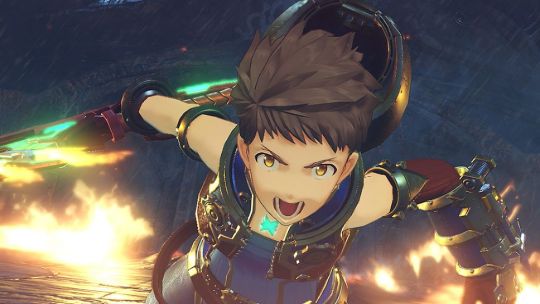
2 notes
·
View notes
Text
Xenoblade Chronicles 2 - class cut
Honestly, I strongly dislike watching this video game-style story. Not gonna lie I probably zoned out watching some of the episodes. From what I got from the first videos was that people used to live in Elysium or Alrest created by the Architect and they used to have power over the land. That the people are forced to leave by the creator but were provided Titans to live on. The Titans are supposed to be made by the world tree and the Titans are slowly disappearing as well. Gramps told Rex if only people can get along they can live in Elysium. I interpret it as people doing harm to the land in terms of destroying land and others that eventually cities will sink like the Titians. Correct me if I am wrong.
When Rex died, he met a blade (Aegis) she said that even after so long it hasn’t stopped and she wants to go to the real Elysium. But, once again the greed of wanting power (aka Aegis) is the reason who much chaos and violence. I guess what she meant is that people continue to use violence and destroy innocent lives for selfish reasons like to power themselves. Indoline had tried to find Elysium and the Architect but only gain Melos and Pyra/Mathra. He had used Melos for his own power! I think that low-key what made Rex different is that he is trying to help drivers and blades live in peace like how Elysium should be.
The relationship between drivers and blades. I think in one of the episodes Jin states the blades for slaves to drivers and when they die that is when they become free. I think it is necessary to point out the blades are depicted as people but they only exist because of the drivers.
I feel like missed the whole point of the show.

1 note
·
View note
Text
I definitely agree that the Tolmekians and Pejites continues to act selfish by causing further destruction. They didn't care for nature nor human lives in this fight of gaining power. On the other hand, princess Nausicca knows why the Ohms are angry and doesn't blame them. She she apologizes for the actions of humans.
Nausicaä of the Valley of the Wind
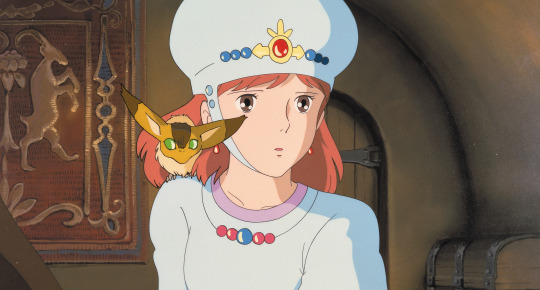
Nausicaä of the Valley of the Wind is a commentary on environmentalism. The movie is set in a post-apocalyptic society riddled with toxins. Things are so bad that they have to wear (oxygen?) masks during the majority of the movie because the air pollution is terrible. The societies we see in the film (Tolmekian and Pejite) insist on fighting one another instead of working together against the issue. They also void themselves of any responsibility as to why the earth is how it is and blame other things (such as the sea of decay) for why things have gotten so bad. This is an allegory for our current society and how we have treated the earth. Most of the damage has been done by big corporations, but individuals cannot be absolved of all responsibility. In the past, the effects of pollution were still being discovered, but even then it is ignorant to think that actions like dumping garbage and toxins into local water sources have no consequence. Even today, despite the various warnings by scientists and activists, a blind eye is turned as the Earth tells of its suffering (most obviously seen through global warming and climate change)
I think it's telling how Princess Nausicaä, a sixteen-year-old, shows more compassion and determination in helping the Earth than others much older. They look up to her because she is the only one who cares enough about the Ohm and the rest of the insects to talk to them instead of firing at them (which is backward in itself- wouldn’t firing at them provoke more anger???) She even sacrificed her life for the baby Ohm, restoring peace between human society and the ohm. This parallels current society, as much of the younger generation is pressured to speak out against the environmental harm humans have caused to the earth.
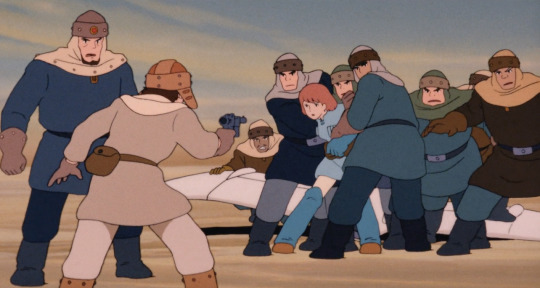
While watching the movie, Princess Nausicaä reminded me of Greta Thunberg, a twenty-year-old, Swedish environmental activist. She has spoken on climate change numerous times, but unlike Princess Nausicaä, I don’t know if we will receive a happy ever after. She has faced much criticism for speaking out against climate change and companies and lawmakers alike prefer to push greenwashed alternatives and ignore the greater issue instead of actively trying to make a change.
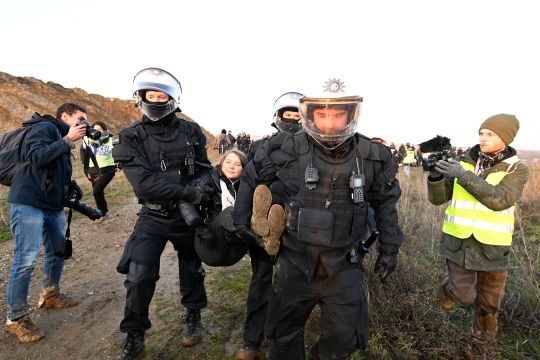
It’s crazy what the previous generations have done to the Earth, and all they've done is dropped the mess in the younger generation's lap with no clear road ahead…
12 notes
·
View notes
Text
Nausicca Of the Valley of The Wind
This film was great to watch! This is a commentary on how mankind continues to be selfish. The Talmekians continue to cause more pollution and destruction. Their presence was the catalyst of the “Valley of the Wind” destruction and enraging the Ohms insects. Princess Kushana's goal was to relieve the warrior to burn down the toxic forest because the insects had taken her arm. However, her army continues to use aircraft ships, and tanks that continue to release pollution. She and some of the Pejitei didn’t care about the consequence of burning the forest and they were only kind about gaining power.
Princess Nausicca from the very begging has so much regard for the toxic jungle and the ohms. She had so much appreciation for the shedding of the Ohm shell, the same ohms that are a “threat” to humankind. When saving Yupa, her first thought was to reason with the Ohm and redirect the insect back to the jungle. She doesn’t like to hurt the insect and apologized for the actions of humankind. When she discovers that the Ohms are here to protect the purified water, soil, air, and plant under the toxic jungle from humans from polluting it again. She understand that it was the human fault for the toxic jungle. For some reason, she kinda represents mother nature to me. She has an earthy connection with the Ohms, trees, and other animals. She also proves that nature and humans can cohabit if they don’t harm each other.
This reminds how countries built nuclear power plants that when if something goes bad then it will pollute the surrounding air, water, animals, and flora. It saddens me that even knowing this, we continue polluting the environment. Current events, we had chemicals in Ohio that may pollute the environment, Pennsylvania has contaminated water and the approval of the willow project. Humankind continues to harm nature and it is understandable that nature will become angry like the Ohms.

3 notes
·
View notes
Text
SWAMPCON
This was my first convention ever! Personally, I didn’t really enjoy the experience at swapcon. It wasn’t the convention itself or anything. My social anxiety and going solo had made my experience less enjoyable. If I had gone in with my friends, then I would be less anxious and be able to enjoy the convention more. Moving along, I went Sunday morning for like 2 hours.
One of the first things that I went to was the vendor booths. I wanted to see the different types of fandom merchandise. There was a booth that sold furries things, like tails and ears. That was not my cup of tea. There was a Pokemon focus table but it didn’t only sell pokemon merchandise. I was attempted to buy some small naruto figurines but the price was worth it. Most of the vendors displayed jewelry, pins, and stickers that were based on anime, memes, and cute items. The only thing that I bought was some stickers of the Supernatural character, Dean Winchester, from the small obsession booth. Honestly, I was surprised to find supernatural merchandise here. Next, I went to the art room. This is where independent artists made fan art through pins, jewelry, keychains, t-shirts, prints, and posters based on anime or moe elements. This definitely reminds me of the otaku culture of buying and selling fan derivatives. I found it interesting that some art displayed the usage of that database of moe elements, not artists based their art on anime characters. I knew that some had spent a lot of money to obtain these fan derivatives like what we saw in Genshiken representation of the Otaku at conventions.
One of the ways that Otaku is able to make fiction their own was in the form of cosplay. On way to the convention, I saw many in cosplay. Most of the cosplay I did not recognize. I saw a lot of elves and furries. It was fun to see a group of friends planning a group cosplay. One of the group cosplay that I recognize was team rocket, Jessie and James. Only if they had a third friend that could’ve cosplayed Meowth. I saw the commitment in the elaborate cosplay that enter the contest. They had handmade costumes and accessories that put some online stores to shame. I saw a couple of cosplayers that were very uncomfortable shoes that cause them to limp when walking. However, they didn’t care about the pain and cared more about the cosplay. This had remind me of the episode in Genshiken when Madarame had hurt his wrist and refused to acknowledge the pain until he had his doujinshi. I am shocked and impressed by their dedication to their cosplaying.
I decided to go to the maid cafe because, in high school animes, they had an episode that had a maid cafe theme for their school festival. I gotta say the people that dressed in maid and butler costumes were really dedicated. Near the end of the event, the maids put on a dance performance. It was a good performance. I overheard one of the maids saying to one of their friends that she put a lot of effort into making her maid costume.
I saw a lot of otaku culture at this convention through the repossession of fiction through cosplaying and fan derivatives. I saw the dedication of the cosplayers. They made elaborate costumes and cosplayed through the pain.
Hopefully, I can experience more of the otaku culture at a bigger anime convention that I planned to attend with my sister.

These are the stickers that I decide to buy at the small obsession booth!
1 note
·
View note
Text
I definitely agree that this movie had much sexual references. First, Shinji reaction to Asuka body. Gendo squeezing Rei breast and stopping at her abdomen to start the process to reunite with Yui. That was weird as hell and creepy. Misato kissing shinji to motivate him to fight and stated she will show him other adult thing after the fight.
The End of Evangelion
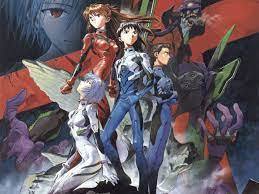
…What did I just watch? In all honesty, this movie left me more confused than the final episode, 28, of the series. Perhaps I wasn’t paying attention enough, but this movie definitely offered more graphic and maturer content than the series. In the first few minutes of the movie, we see Shinji is in distress because Asuka is in the hospital and is unresponsive. My thing is, when did Shinji and Asuka become so buddy-buddy? In the previous episodes, we saw how tense any interaction between Shinji and Asuka was. Maybe this friendship “blossomed” in the between episodes, but still Shinji was at an all time low in this movie and it showed. However, why the heck does it pan to Shinji’s hand that is covered in a white, sticky substance…? *bombastic side eye* This boy was literally boo-hoo crying over Asuka being unresponsive and had the audacity to become aroused to her half naked, prone, and unresponsive body? Like what? Shinji even says in the hospital room that he “is the lowest of the low”, and I completely agree because what in the world compelled him to do that? Don’t even get me started on Katsuragi KISSING Shinji???? (RIP Katsuragi) But what? Then she says “that’s how grown ups kiss”. Maybe I wasn’t paying enough attention, but this series left me more confused and flabbergasted than I’ve ever been before with a series.
6 notes
·
View notes